Key takeaways:
- Global pandemic responses highlighted the importance of trust, clear communication, and adaptability among nations with differing resources.
- Research into Covid health significantly influenced public health strategies and vaccination trust, emphasizing the need for ongoing studies to prepare for future pandemics.
- Public health policies had profound impacts on societal behavior and economic conditions, showcasing the necessity for a holistic approach that balances health and livelihoods.
- Personal experiences during the pandemic underscored the value of connections, the dangers of misinformation, and the importance of mental health support in crisis preparedness.
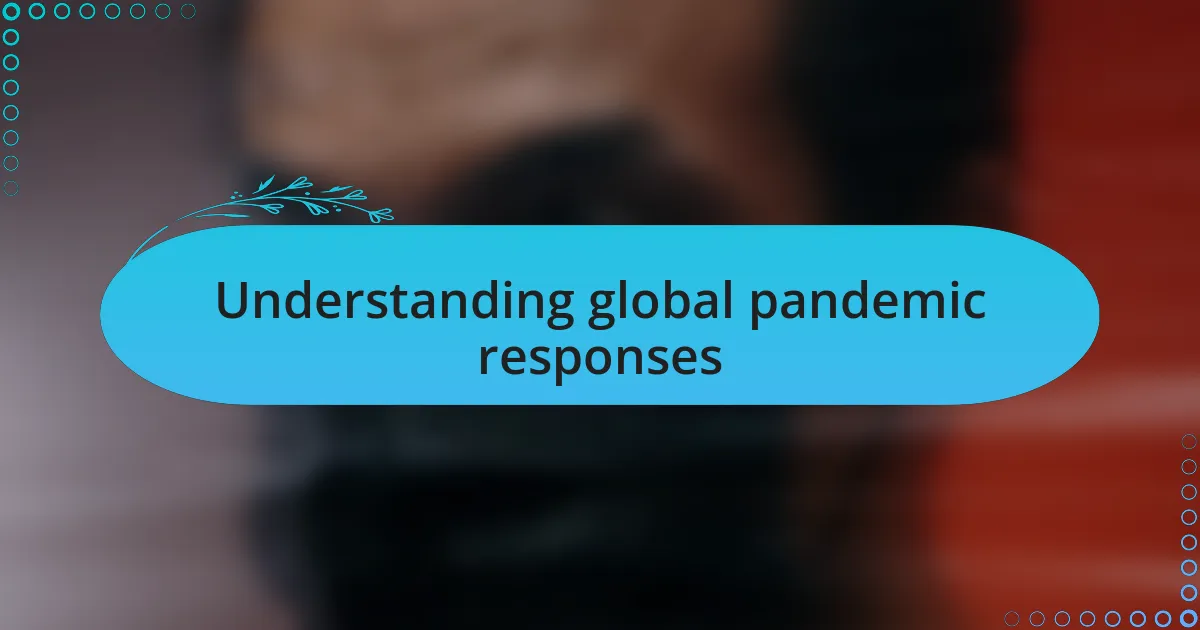
Understanding global pandemic responses
Understanding global pandemic responses reveals how interconnected our world truly is. I remember watching news reports and feeling a jolt of anxiety as countries locked down almost simultaneously; it was eye-opening to witness how swiftly decisions were made in the face of a common threat. How could nations with vastly different resources and political structures come together so quickly, yet respond so differently?
Some countries excelled in contact tracing and communication, while others faced severe criticism for delays and misinformation. It was striking to see the emotional toll on citizens worldwide, many feeling stranded in their homes, wondering if their governments were doing enough. I often found myself questioning how trust plays such a crucial role in these responses—why do some populations comply with health measures while others resist?
Reflecting on the varied outcomes, it’s clear that swift science communication mattered greatly. I recall feeling both relieved and frustrated by the constant updates, sometimes struggling to keep pace with changing guidance. How can we learn from these experiences to improve future health crises? It’s a complex puzzle, yet understanding the successes and failures of global responses gives hope for more agile strategies in the future.
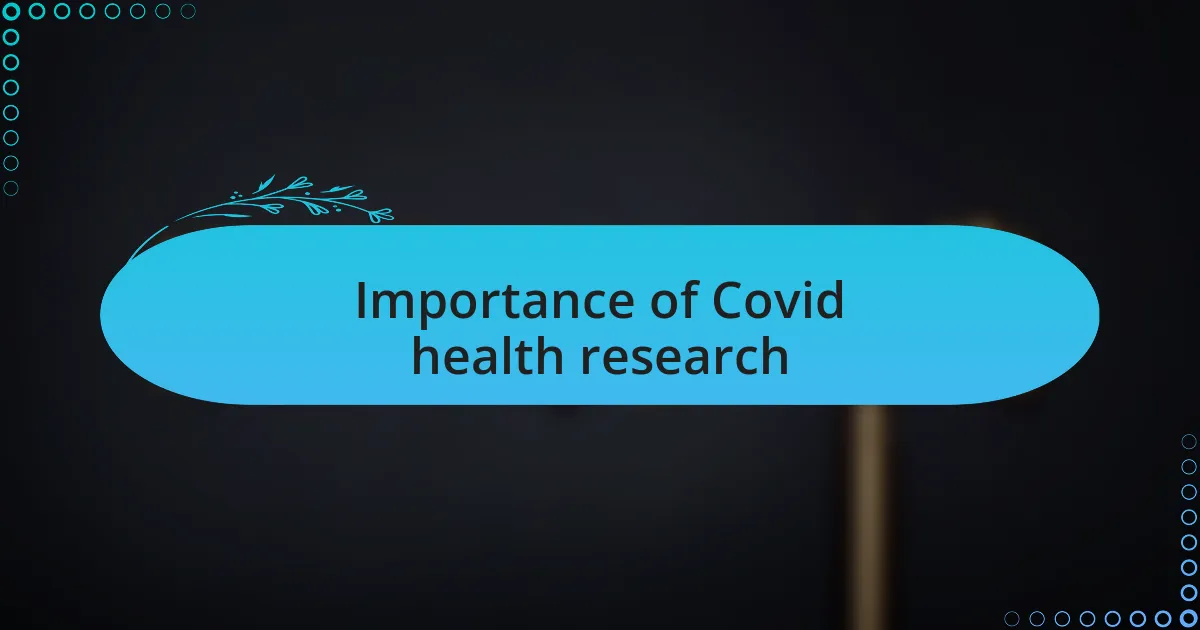
Importance of Covid health research
Research into Covid health has been critical in shaping our understanding of viral transmission and treatment options. I frequently found myself immersed in studies that highlighted the importance of data collection and analysis, which played a key role in informing public health strategies. How invaluable it was to see scientists and researchers tirelessly working to decode the virus’s behavior!
Moreover, the findings from Covid health research have fostered trust in vaccination efforts. I can still remember the moment when the efficacy data for the vaccines started pouring in; it was reassuring to see solid evidence guiding our choices. This kind of transparency is essential. It makes one reflect on how crucial it is to communicate health information clearly to combat misinformation effectively.
As we process the lessons learned from this pandemic, the importance of ongoing Covid health research cannot be overstated. It equips us with knowledge that not only addresses immediate health concerns but also prepares us for future pandemics. Isn’t it fascinating to think about how past discoveries in pandemics have paved the way for innovative solutions today?
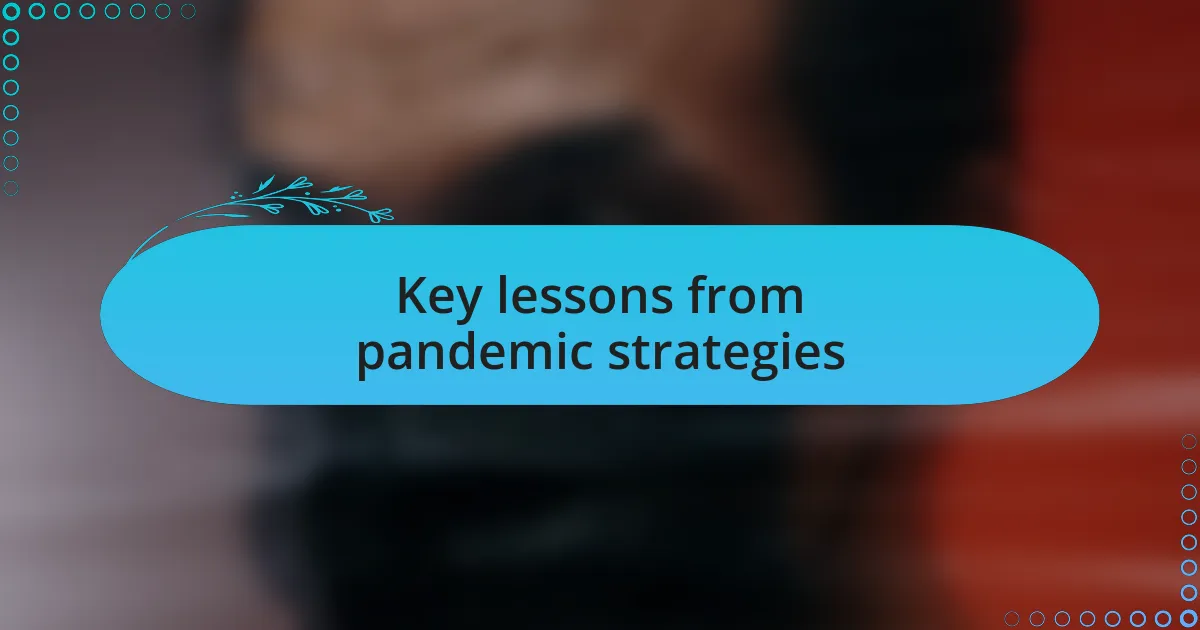
Key lessons from pandemic strategies
When reflecting on pandemic strategies, one key lesson I learned was the importance of flexibility in response plans. I remember when data about the virus evolved almost daily, causing health officials to pivot quickly. This adaptability wasn’t just vital; it became a lifeline for communities trying to grasp an ever-changing situation. How often do we wish our plans could be more fluid, responding seamlessly to new information?
Another concept that stood out to me was the power of collaboration. During the pandemic, I witnessed various sectors unite to tackle a common challenge—scientists, healthcare workers, and even businesses working hand in hand. This collective effort revealed how pooling resources and expertise can lead to quicker, more effective solutions. It raises the question: what if we leveraged this spirit of collaboration in other areas of public health?
Finally, I learned that clear communication is paramount. I often found myself overwhelmed by the flood of information, yet I equally appreciated updates from trusted sources that distilled complex data into understandable messages. Those communications not only informed but also reassured us, fostering a sense of community. Reflecting on this, I wonder how we can maintain this level of transparency even after the pandemic fades.
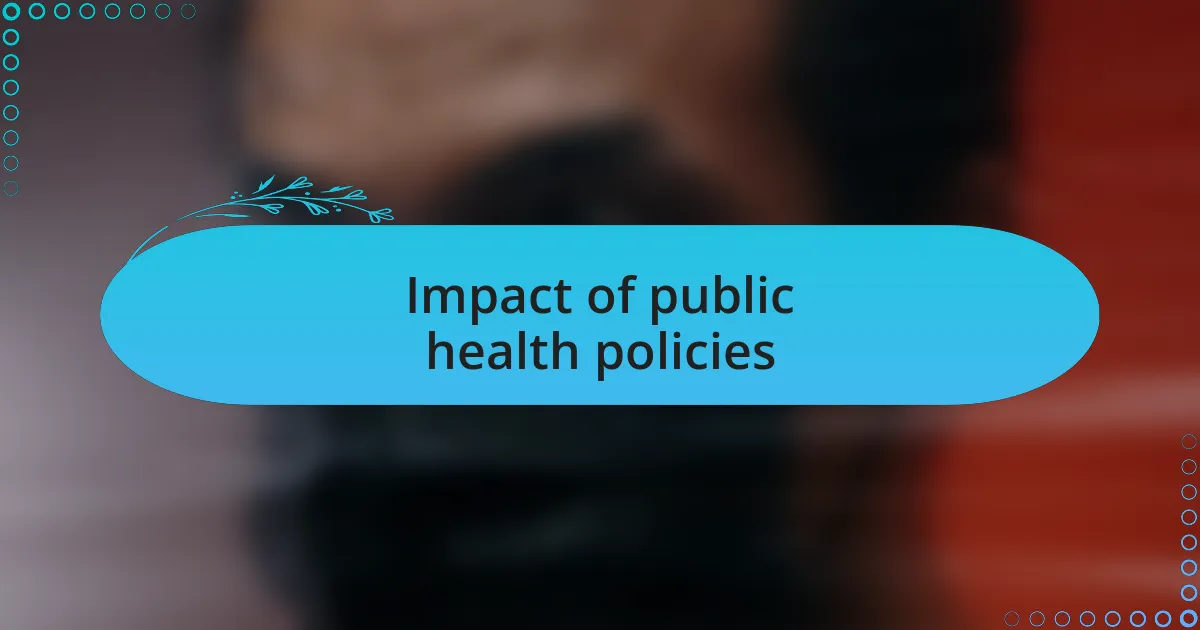
Impact of public health policies
The impact of public health policies during the pandemic was profound, shaping not only health outcomes but also societal behaviors. I still remember the moments when mandates like mask-wearing and social distancing were introduced. It felt surreal to have our lives so dramatically altered overnight. Was it effective? Absolutely. These policies played a critical role in slowing transmission rates, which made me reflect on how quickly we can collectively adapt to new norms.
One thing that really struck me was the differing public reactions to policies in various regions. In some areas, strict lockdowns were embraced, while in others, resistance emerged. I watched communities rally together in solidarity, but tensions also surfaced, highlighting how essential it is for policies to resonate with local values and beliefs. How do public health officials strike this delicate balance between necessary interventions and public sentiment?
Moreover, the economic repercussions of these public health decisions were hard to ignore. When I saw local businesses struggling due to closures, it broke my heart. Public health policies must consider not only health outcomes but also the broader economic landscape. Isn’t it essential for policymakers to view health through a holistic lens, one that encompasses both well-being and livelihood? Understanding this connection could lead to more compassionate and effective approaches in future health crises.
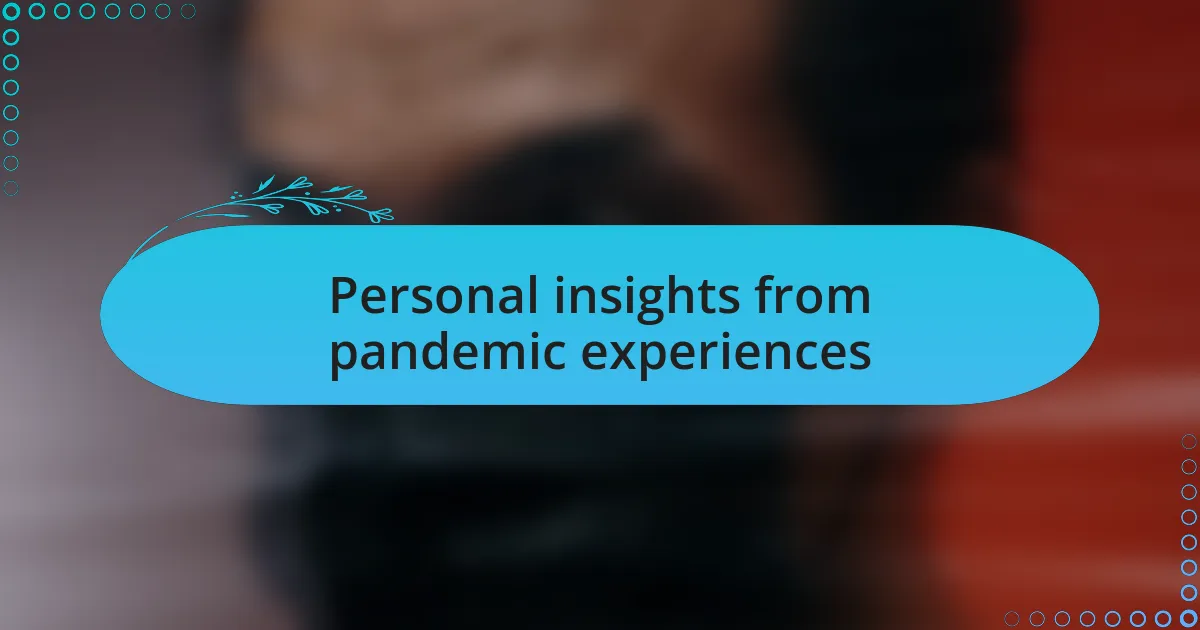
Personal insights from pandemic experiences
Reflecting on my pandemic experiences, I learned that connection takes on different forms. I still vividly remember the video calls with family, the laughter punctuated by distance, but also the heaviness of silence when words felt inadequate. It made me appreciate how crucial human interaction is, sparking a deeper desire in me to maintain those relationships, even if they were virtual for a while. Isn’t it fascinating how adversity can reinforce what truly matters in our lives?
Another insight that struck me was the power of misinformation. I recall a time when a friend shared a viral post about treatments, which contradicted everything we were learning from health experts. The panic it caused led me to realize the responsibility we all have in seeking accurate information. How often do we pause to consider the sources of the narratives we share? Engaging with credible information isn’t just important; it’s vital for our collective well-being.
Lastly, the experience of adapting to change has shifted my perspective on resilience. One day, I was navigating a grocery store with a mask, feeling fearful, and the next, I began to find small joys in the routine. Learning to appreciate those little victories, like a successful shopping trip or a sunny day outside, rekindled my gratitude. Isn’t it interesting how challenges can lead us to a newfound appreciation for simplicity? Through this journey, I learned that resilience isn’t just about enduring; it’s about thriving even when circumstances seem dire.
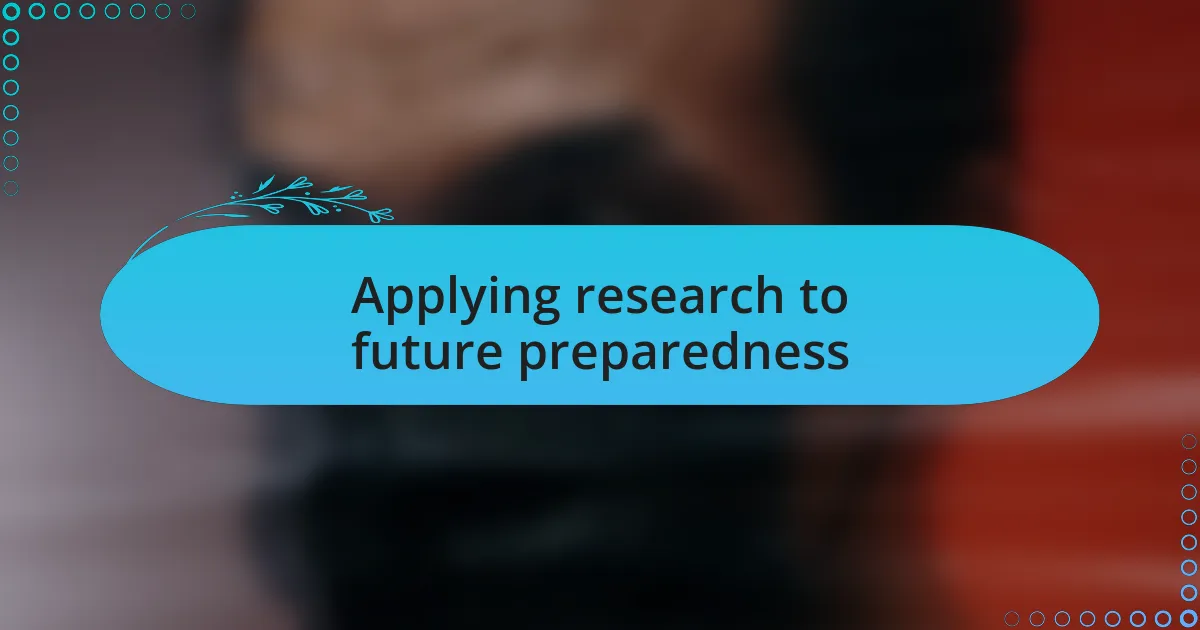
Applying research to future preparedness
When I reflect on the research done during the pandemic, it’s clear we must harness that knowledge for future preparedness. For instance, I remember reading about how swiftly scientists developed mRNA vaccines. It was inspiring to witness collaboration across borders, showing that when we unite in the face of a crisis, incredible advancements are possible. What if we approached future health threats with the same urgency and spirit of collaboration?
Additionally, I’ve come to appreciate the role of data in shaping responses. I recall being part of a community forum where local health officials used real-time data to make informed decisions about lockdowns and resource allocation. This data-driven approach reassured me and emphasized how vital accurate information is when managing public health crises. Don’t you think that using evidence-based practices can better prepare us for unexpected challenges in the future?
I can’t help but consider the lessons learned about mental health support. One moment that stands out to me was during a community wellness event where experts discussed coping strategies. It highlighted the need for readily accessible mental health resources in times of crisis. How often do we plan for physical health without addressing psychological well-being? A holistic approach could truly enhance our resilience when the next crisis arises, ensuring we care for both body and mind.